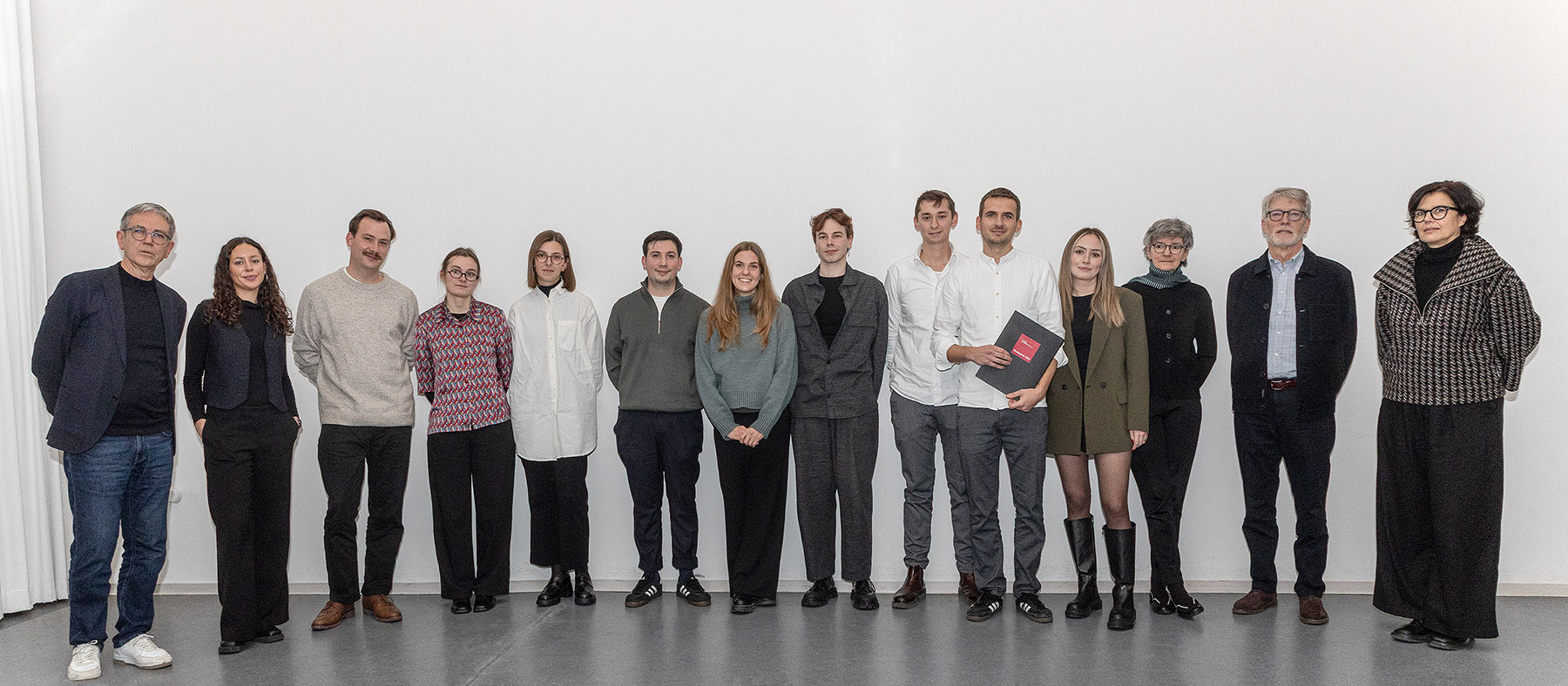Schelling Study Award 2025

On November 19, 2025, the Schelling Study Prize of the Schelling Architecture Foundation was awarded for the sixth time at the KIT Faculty of Architecture. Since 2015, this prize has been awarded every two years to the best final theses by students of the KIT Department of Architecture. A total of ten Master's theses were nominated. The Schelling Study Prize is the student counterpart to the renowned Schelling Architecture Prizes for Architectural Theory and Architecture, with which the foundation has been honoring pioneering developments in architecture and outstanding achievements in architectural theory since 1992.
The jury for the study prize always includes the last winner of the architecture prize. This time, it was the Dutch architecture firm LOLA Landscape Architects, which was awarded the Schelling Architecture Prize in 2024. The jury also included KIT graduate Silvi Kociu, the last winner of the 2023 Schelling Architecture Prize, as well as four members of the Schelling Architecture Foundation Board of Trustees: urban planner Prof. Dr. Kathrin Golda-Pongratz (Universitat Politècnica de Catalunya BarcelonaTech), architecture critic Kaye Geipel, architecture theorist Prof. Dr. Georg Vrachliotis (TU Delft) and architect Prof. Tobias Wallisser (LAVA, Berlin).
Prof. Ludwig Wappner, former head of the Chair of Design and Building Construction, and Prof. Dr. Ludger Hünnekens hosted the event together with Dr. Ursula Baus from the Board of Trustees of the Schelling Architecture Foundation.
An outstanding series of socially relevant tasks
The jury recognized the special quality of the submitted works, "... which results from the diversity of their approaches: from small, practically implementable projects at the interface between the built environment and nature, from utopian concepts for a renewed coexistence in the context of our technical environment, as well as from designs that sensitively develop existing structures.
Across all ten finalists, there is an outstanding range of socially relevant tasks, combined with a responsible use of resources and an attitude that has been worked through down to the last practical detail - even where there are few role models to date. Bravo for this selection!"
Two first prizes
For the first time, the main prize of 2,000 euros was shared. Johann Kuhn was honored for his master's thesis "Poetic Cultural Landscapes - A Walk in the System of Water Meadows".
The master's thesis deals with the little-known cultural landscape of water meadows, in which large agricultural areas are periodically flooded, creating the basis for the cultivation of specific crops. In the area between Hausen and Forchheim on the Regnitz, Johann Kuhn has explored and mapped the remaining elements with archaeological meticulousness on countless walks. The project reactivates and supplements these structures to create a functioning system. Production, recreation and a reserve for animals and plants overlap in the inter-urban landscape park. The work was created in the winter semester 2024/25 and was supervised by Prof. Christian Inderbitzin and Prof. Dr. Riklef Rambow.
The second 1st prize went to Emilia Send elbach for her work "The canal keepers - hybrid filters to revitalize the Landwehr Canal".
Emilia Sendelbach's work is an urban planning project on a large scale - and manages with minimal intervention. The filters distributed across the listed and heavily polluted Landwehr Canal in Berlin are not architecture in the broadest sense, but rather symbolic apparatuses. The project shows how heavily polluted inner-city waterways can be brought into the public consciousness by improving water quality. Water ecology, technology and architecture are merged into a sustainable unit that strengthens the presence of the canal as an urban entity in the consciousness of Berliners. It was created in the summer semester 2024 under Prof. Christian Inderbitzin and Prof. Dr. Joaquín Medina Warmburg.
Recognitions
In addition, two awards, each endowed with 500 euros, were presented to Michael Hosch and Nina Rau.
In his master's thesis "In/Visible Infrastructure", Michael Hosch discusses how infrastructures for sustainable energy supply reshape our natural and built environment. He transforms the existing principle of an energy storage facility, which serves to compensate for fluctuations in renewable energies, into a publicly usable infrastructure. This spans the tracks at Frankfurt Central Station. The continuously fluctuating latent energy states of the 2000 weights become a constantly changing spatial landscape that serves commuters as a place to stay and wait. The work was created in the summer semester 2023 with Prof. Marc Frohn and Prof.'in Andrea Klinge.
More information:
Nina Rau's master's thesis "Safe Space / A place for women and their children for protection against domestic violence in the west of Karlsruhe" deals with the architectural conception of a women's shelter in the west of Karlsruhe as a necessary shelter for women and their children affected by domestic violence. The aim of the theoretical and practical elaboration is to develop a spatial concept based on social science findings and the resulting requirements, which optimally combines safety, privacy and community structures. Based on the knowledge gained, an architectural design concept for the house and garden will also be developed that harmonizes functional, design and safety aspects in a beneficial way. The work was created in the winter semester 2024/25 under Prof. Ludwig Wappner and Prof. Dr. Riklef Rambow.
The following projects were also nominated:
Toni Bistritz
Origin and future - Transformation of a church in Karlsruhe-Neureut
Prof. Dirk Hebel
Prof. Dr. Riklef Rambow
Franziska Alt
Kultsilo / From granary to cultural and creative center at the eastern port of Saarbrücken
Prof. Ludwig Wappner
Prof. Dr. Riklef Rambow
Guillermo Vera
The shape of water - around it, under it, over it
Prof. Marc Frohn
Prof. Dr. Joaquín Medina Warmburg
Paula Mercedes Seifert
Along the delta - architecture in between
Prof. Meinrad Morger
Prof. Dr.-Ing. Joaquín Medina Warmburg
Sascha Seidt
Hortus Inclusus - The botanical garden as an urban mediator
Prof. Meinrad Morger
Prof. Henri Bava
Fabienne Savic
In the glass house with stones
Prof. Christian Inderbitzin
Prof. Dr. Joaquín Medina Warmburg
Congratulations to all!
To the website of the Schelling Architecture Foundation
